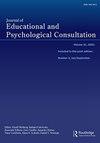Evaluating Universal Screening with Community-Oriented Collaboration on Students’ Receipt of Social, Emotional, and Behavioral Intervention
IF 1.1
4区 心理学
Q4 PSYCHOLOGY, EDUCATIONAL
Journal of Educational and Psychological Consultation
Pub Date : 2020-04-02
DOI:10.1080/10474412.2019.1654882
引用次数: 3
Abstract
ABSTRACT Tiered response models encourage a proactive approach to identification of social-emotional needs and intervention. However, schools experience barriers to adopting and implementing such models that use data to allocate interventions. The current study examines the utility of a universal social-emotional learning (SEL) screening system embedded in an empowerment evaluation framework to improve intervention receipt. Teachers at two primary elementary schools rated all students with an SEL screening system in a tiered response model. The intervention school received screening results with empowerment evaluation supports while the comparison school did not receive screening results and proceeded with intervention decision-making as usual. Intervention receipt results were analyzed with chi-square tests and descriptive comparisons. The intervention school served a greater number of students with interventions, was more likely to intervene for students with SEL need, and implemented a greater number of small-group interventions than the comparison school. Limitations and future directions are discussed.以社区为导向的合作评估普遍筛查对学生接受社会、情感和行为干预的影响
摘要分层反应模型鼓励采取积极主动的方法来识别社会情感需求和干预。然而,学校在采用和实施这种利用数据分配干预措施的模式方面遇到了障碍。目前的研究考察了嵌入赋权评估框架的通用社会情感学习(SEL)筛查系统对提高干预效果的效用。两所小学的教师采用分层反应模型,用SEL筛查系统对所有学生进行评分。干预学校收到了带有赋权评估支持的筛查结果,而对照学校没有收到筛查结果,照常进行干预决策。干预接收结果采用卡方检验和描述性比较进行分析。与对照学校相比,干预学校为更多的学生提供了干预服务,更有可能为有SEL需求的学生进行干预,并实施了更多的小组干预。讨论了局限性和未来的发展方向。
本文章由计算机程序翻译,如有差异,请以英文原文为准。
求助全文
约1分钟内获得全文
求助全文
来源期刊

Journal of Educational and Psychological Consultation
PSYCHOLOGY, EDUCATIONAL-
CiteScore
3.40
自引率
23.50%
发文量
20
期刊介绍:
The Journal of Educational & Psychological Consultation (JEPC) provides a forum for improving the scientific understanding of consultation and for describing practical strategies to increase the effectiveness and efficiency of consultation services. Consultation is broadly defined as a process that facilitates problem solving for individuals, groups, and organizations. JEPC publishes articles and special thematic issues that describe formal research, evaluate practice, examine the program implementation process, review relevant literature, investigate systems change, discuss salient issues, and carefully document the translation of theory into practice.
 求助内容:
求助内容: 应助结果提醒方式:
应助结果提醒方式:


